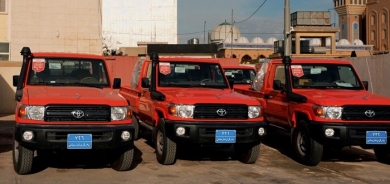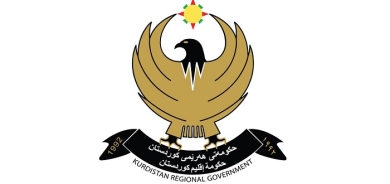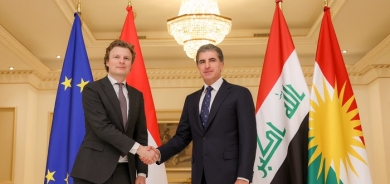The Shape of Kurdistan

Why is that? Because the life and rebellions of Mullah Mustafa Barzani forced people to define what they were arguing over when they talked about Kurdistan. When they fought over it, too. There are three elements of his life that had key roles to play in establishing the shape of Kurdistan as it stands today.
The first is that his rebellions were primarily against the Iraqi government. There were moments when he was involved in rebellions against the British, or where he was attempting to defend the Mahabad Republic, far from Iraq. However, those do not seem to represent the main elements of his rebellions. Indeed, his travels to the Mahabad Republic were themselves the result of a failed rebellion in Iraq.
The result of these rebellions was that they tended to define the fight for Kurdistan as one occurring essentially in Iraq. Although historically, Kurdistan spread over parts of several modern day countries, Mullah Mustafa Barzani’s actions helped to define the struggle for independence primarily as one against Iraq. Which meant that Kurdistan, when it came into being as a largely autonomous region in the 1990s, was contained entirely within Iraq.
This geographical focus is maintained by the emphasis on Barzan and the wider region around Erbil through much of Mullah Mustafa Barzani’s life. Although this is no more than a natural consequence of where he happened to be brought up and based in Kurdistan, it has helped to contribute to an idea of Erbil as being at the heart of Kurdistan. Again, this has helped to create an essentially Iraq-based vision of Kurdistan, but it also helped to shape political elements such as the location of the parliament.
We have the failure of the Mahabad Republic. Although it is hardly something that was down to Mullah Mustafa Barzani, it is an experience within his life that was crucial to the shape of Kurdistan today. It taught him and others that attempting to establish a homeland elsewhere was unlikely to succeed, and so brought the focus back onto the region that we now know as Kurdistan.
Finally, and perhaps most importantly, we have Kirkuk. Mullah Mustafa Barzani refused to give up Kirkuk in the 1970s, even though it meant a longer conflict with the Baghdad government. That decision has had a key impact on both the shape and economic viability of Kurdistan today, giving the region a very different shape to the one it would have had without the city but also providing it with the resources to rebuild.
If Mullah Mustafa Barzani may have shaped Kurdistan geographically, he certainly did so politically. He played a key role in the establishment of the PDK, and led it for many years. As the PDK continues to be one of the largest political parties in Kurdistan, and provides its president at the time of writing, it is hard to deny the impact of Mullah Mustafa Barzani on the shape of Kurdistan’s political landscape.
Indeed, his impact extends on a more personal level, since his son, Massoud Barzani, is Kurdistan’s first president, and other relatives of Mullah Mustafa Barzani are forging important political careers for themselves. Although there may have been those who have questioned so many members of the same family going into politics, it is hard to deny that Mullah Mustafa Barzani’s life instilled the desire to enter into that arena in his family.
On a wider level, Mullah Mustafa Barzani had a role to play in bringing about Kurdistan’s current party political system, starting a move away from purely tribal politics. Just founding a political party, at a time when it would have been easy to rely purely on personal authority as the son and grandson of Barzani leaders, established Kurdistan’s commitment to democracy in the long term. I am not claiming here that Mullah Mustafa Barzani always behaved in a way that was perfectly consistent with democracy, or that Kurdistan’s democracy has been perfected yet, but he certainly laid the groundwork for the shape of Kurdish democracy. Groundwork that has helped to define the issues and work that the Kurdish parliamentary system does today.
The Image of Kurdistan
How much of an impact did Mullah Mustafa Barzani have on the image of Kurdistan, both at home and abroad? I hope that the second half of this book has convinced you that many of Mullah Mustafa Barzani’s most important achievements came in this field. That he helped to shape Kurdistan’s image of itself in ways that later allowed it to function as an autonomous region. That he helped to craft its identity abroad, keeping the idea of Kurdistan alive with a succession of foreign leaders and not allowing Kurdishness to be subsumed into general cultural life, the way it almost was in, for example, Turkey. More than that, he played crucial symbolic roles, both in terms of preserving Kurdistan’s symbols and in terms of becoming a symbol of Kurdistan himself.
In terms of Kurdistan’s image of itself, Mullah Mustafa Barzani helped to preserve the idea of Kurdistan. To some extent, he helped to create the idea of Kurdistan, at least as we envision it today. When he was born, remember, Kurdistan was largely a world of separate tribes, spread over a large area that had previously been multiple kingdoms. By the time of his death, Mullah Mustafa Barzani lived in a world where Kurdistan understood itself as a coherent nation, where there was a strong sense of Kurdish identity over and above simple tribal identity, and where there were strong symbols of Kurdish national identity, including its flag. Mullah Mustafa Barzani helped to present an image of Kurdistan to itself, helping to form an image that exists today as something real, a region with its own government, society and culture.
In terms of the wider world, Mullah Mustafa Barzani had contact with numerous officials and government officers beyond Kurdistan. Aside from the direct impact of those connections in terms of foreign assistance for my people, those moments of contact almost certainly helped to shape foreign opinions of Kurdistan. For those key individuals in the Soviet Union Mullah Mustafa Barzani met, for example, it seems likely that it would have been the first time they met with a representative of my people. Their opinions of Kurdistan were probably formed in the long term by political reports and briefings, but their immediate image of the region came from meeting Mullah Mustafa Barzani.
Whether it was Iran, the Soviet Union, the United States or other countries, Mullah Mustafa Barzani helped to project an image of Kurdistan and its people into the world. He understood the importance of foreign powers to the region, and he attempted to influence their policies towards it by building their perception of Kurdish identity.
Mullah Mustafa Barzani’s involvement in the symbolism of Kurdistan was no less important. Whether it was carrying the region’s flag with him, maintaining the symbols of the Barzani, or insisting on the preservation of the Kurdish language, he had a key role to play in the maintenance of the symbols of Kurdish identity. He understood the power of symbols, and more than that, he understood that the long term fight for Kurdistan’s independence was not was not just a military one. Even though he is best remembered for his military adventures, Mullah Mustafa Barzani had the vision to realise that constructing a country would take more than that.
More than that, he managed to become one of the symbols that he did so much to promote. Mullah Mustafa Barzani understood the damage that had been done to my people’s sense of history and to their sense of their collective identity. He managed to become a kind of living symbol of their cause in life, with elements such as his survival abroad managing to symbolise the continuation of the Kurdish independence movement. For many people, that movement became Mullah Mustafa Barzani, to such an extent that it seemed natural to bring his remains home to Kurdistan following his death, and that people continue to have his image around them through large swathes of Kurdistan.
To a great extent, Mullah Mustafa Barzani came to symbolise what it meant to be Kurdish. He was a man willing to fight for his home and his identity, who for much of his life was not able to live in his home country. He was a part of the old tribal life and a part of the modern world. An international traveller who nevertheless came to be buried in Kurdistan. In a Kurdistan in need of symbols, Mullah Mustafa Barzani’s role in shaping its image of itself cannot be underestimated.








